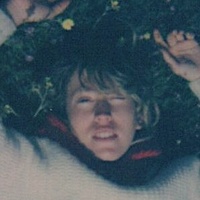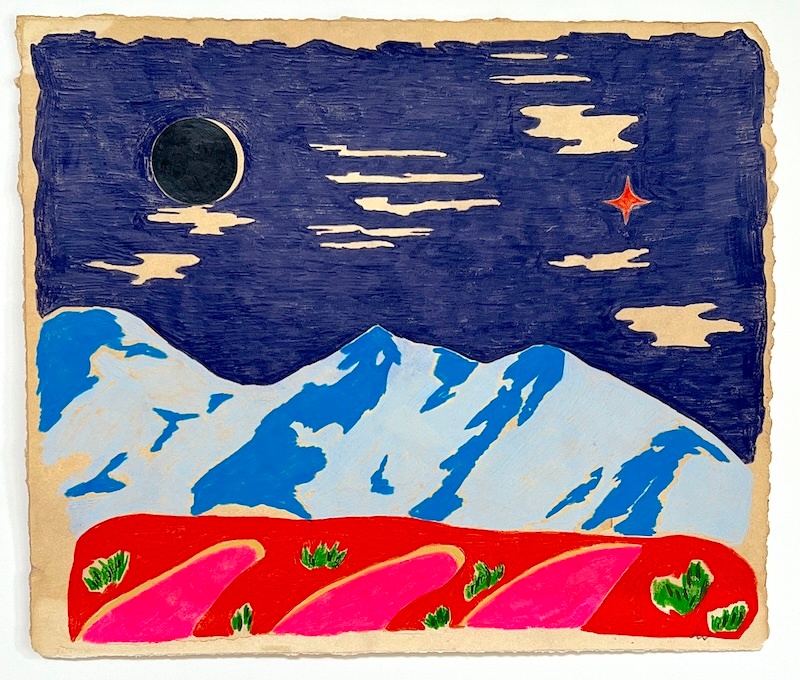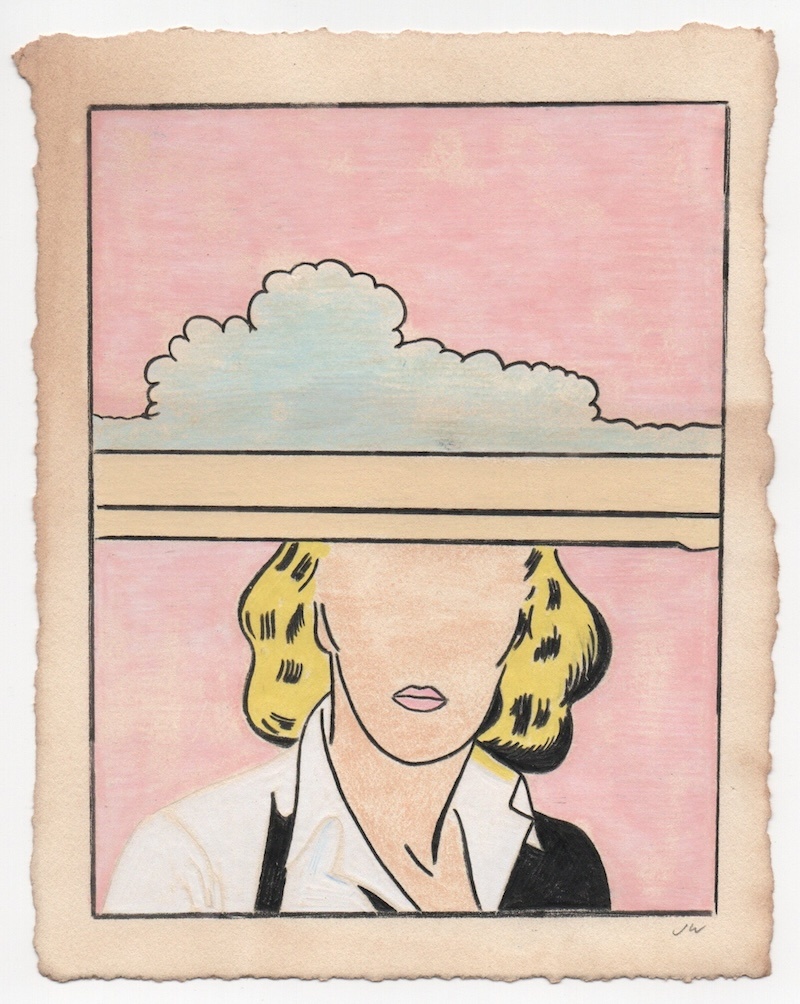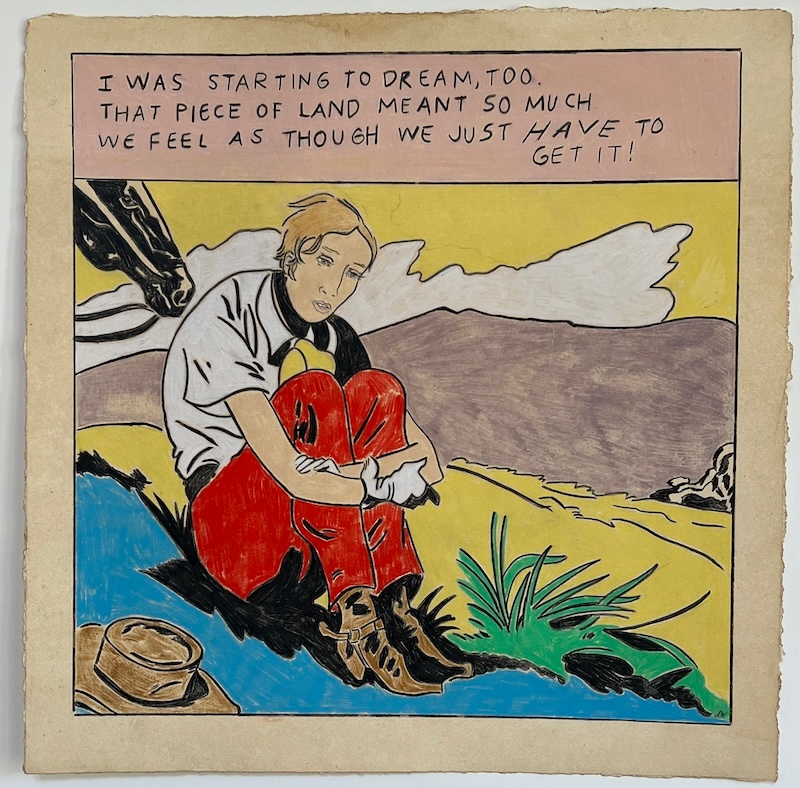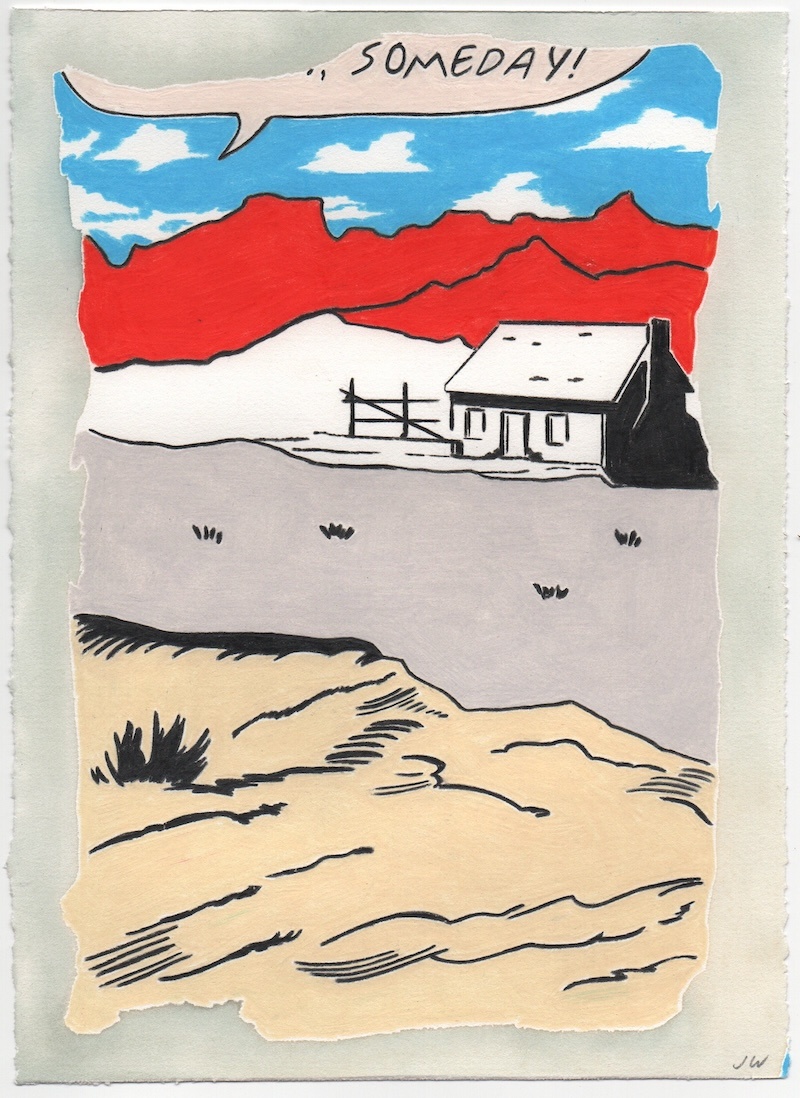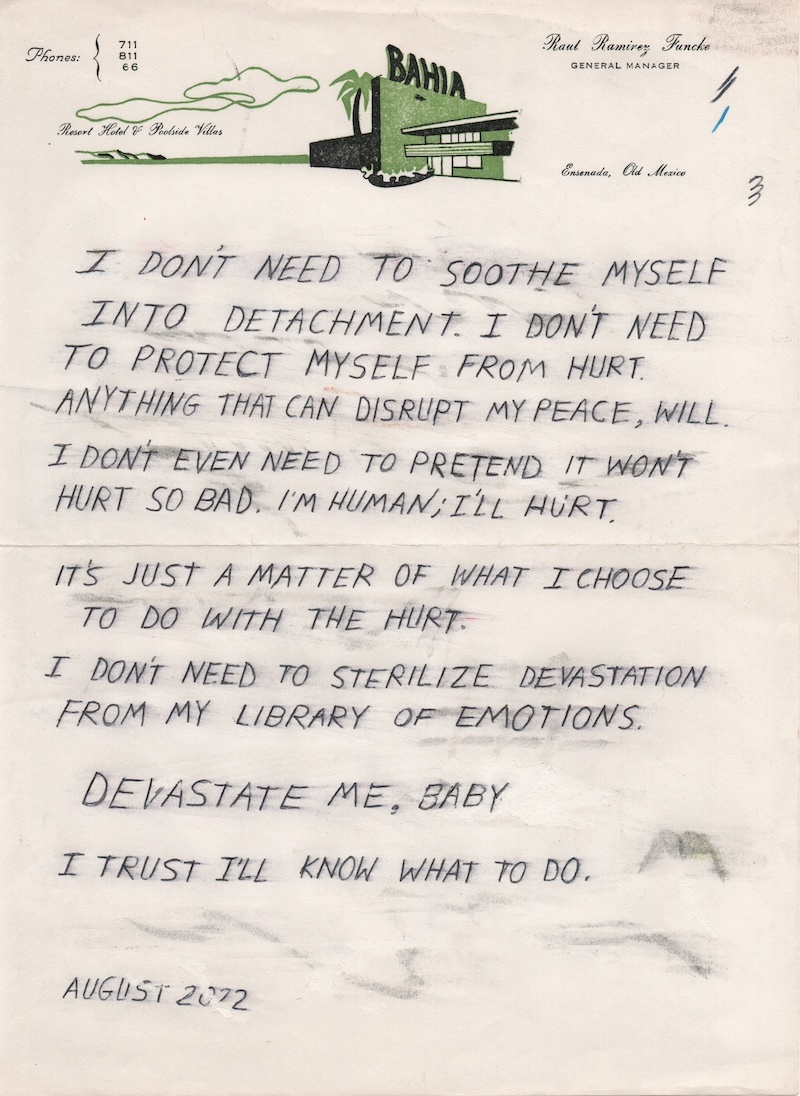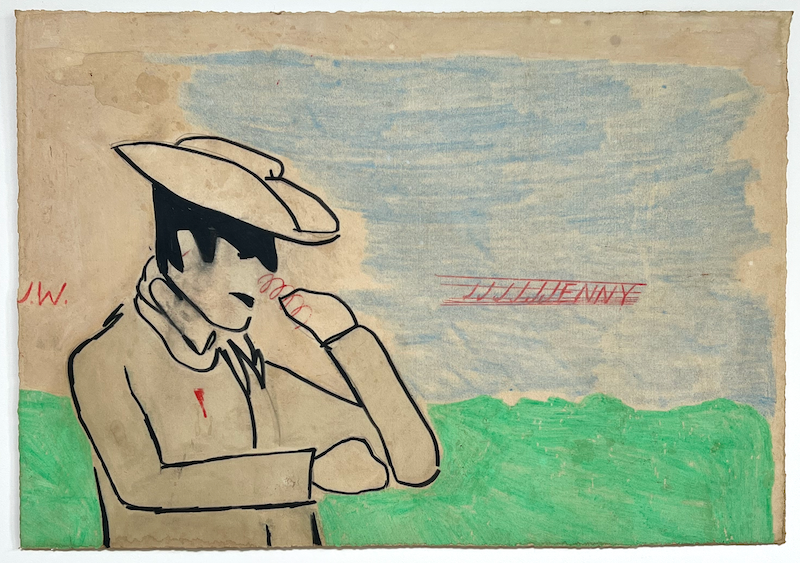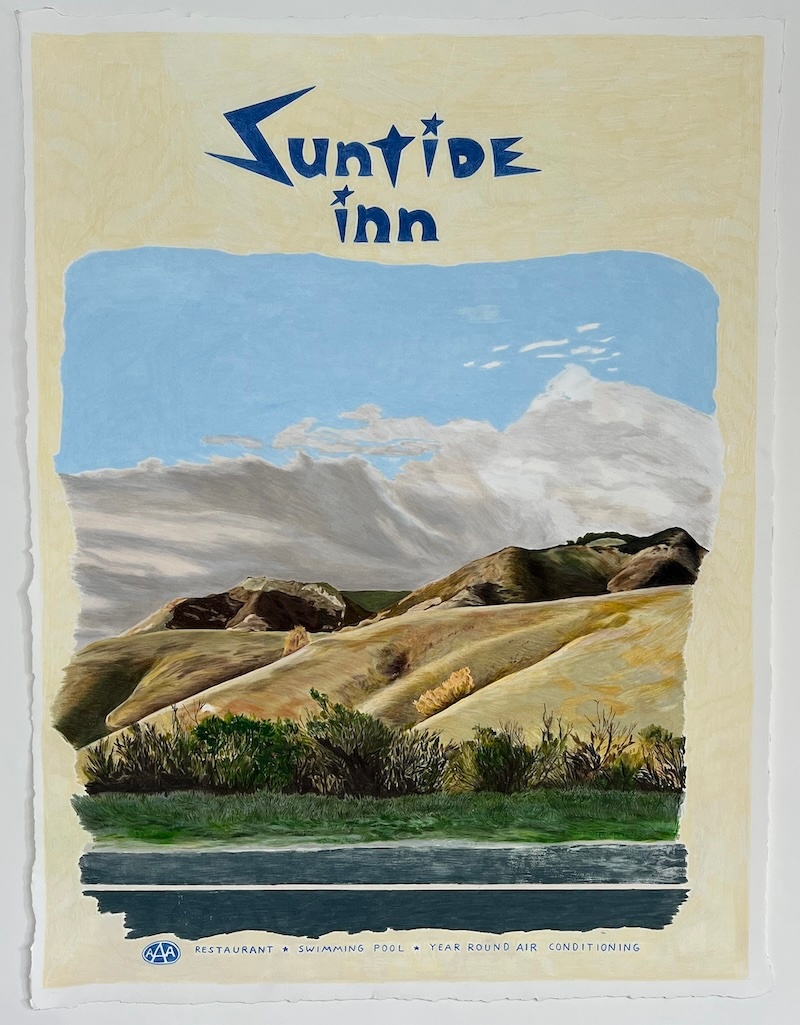As told to Carolyn Bernucca, 2346 words.
Tags: Writing, Illustration, Art, Process, Mental health, Money, Education, Success.
On the fantasy and reality of being an artist
Writer and illustrator Anna Fusco discusses conceiving of new realities, the fallacy of the creative rut, and finding defenses against distraction.Broccolini Ridge, color pencil on tea-stained paper 6 1/4 inches x 8 11/16 inches, 2023.
When did you first feel like an artist?
I’ve been very expressive my whole life. There’s always been a proclivity towards the arts, always in the art room at school, always being guided in that direction by my teachers, my mentors, and myself. What I do today is the natural trajectory of showing up to something at least four days a week since I was a child. It’s a part of my soul. So in that sense, of course I’m an artist. But at the same time, there’s an inevitable imposter syndrome. Sometimes I’ll receive feedback that’s just the warmest thing you could dream of, and it feels like somebody else is getting that compliment.
It feels like I hit the lottery, like I’m in a very limited window of time where I’m able to pull the wool over everyone’s eyes. That might be a protective mechanism. There’s a disassociation, a tendency to deflect or diminish my work, like, “I’m not really an artist, this is just my holding place until I have to get a real job.” And maybe that’s because—and I’ve heard other artists talk about this, too—sometimes I just feel like a vessel. Whatever’s coming through me is something else, like a spirit, so I almost don’t take credit for it.
Lights out on a northern trail, color pencil on tea-stained paper 12 1/16 inches x 10 3/16 inches, 2023.
How did you create a path for yourself as an artist?
I was in and out of school, but I decided to finish my degree at 26; by that point, I already had a portfolio and an ability to articulate myself, and I got a huge financial aid package. I was in the [art] teaching program, until one day, the head of the printmaking department was like, “Do you really want that? You don’t have to do that. You should just be an artist.” That 40-minute conversation altered the course of my life. I switched into printmaking and devoted myself to that for the next two years. I don’t think school is necessary for everyone, but it was so helpful, and an extreme privilege, for me to be in an environment where being an artist is not only seen as possible—it’s the expectation.
Ghost Town Jenny, color pencil on tea-stained paper 6 1/4 inches x 7 7/8 inches, 2023.
I owe a lot of what happened next to timing, to lockdown, and to privilege. I was only out of school for a few months when COVID hit. I didn’t get sick, I didn’t have to take care of anyone, I didn’t lose my housing, so I was able to hide out, get unemployment, and make art all the time. There was a New York-based Food Service Workers Coalition raising funds for undocumented workers who couldn’t get unemployment benefits, so I sold one drawing on Instagram as a print, and donated all net proceeds to the coalition. Then I did it again, and again, and then people started asking if I had an online store.
It took me a few months to hear the call and recognize, “This is what’s happening. This is your life. You can do this.” Since then, it’s just been a ball rolling downhill and uphill and downhill again. The store is how I support my writing and drawing practices now, rather than working a service job. That work has attracted a few galleries, allowing me to have a couple solo exhibitions of less commercial work.
You have to dream things out before they become real, Jenny!, color pencil on tea-stained paper 15 1/8 inches x 15 1/8 inches, 2023.
What is something you wish someone told you when you began making art?
I think if someone asked me, “Okay, what do I need to know?” I would just say, you’ll need more time than you think for everything. It takes time to really feel into what you’re doing and creating and get into a flow. I noticed an expectation, within myself, that things would happen quickly. But art is one thing that just cannot be rushed. It might take years of sucking. If you are doing anything with a sense of urgency, it’s not going to land.
And I don’t know if I wish someone had told me this, because I think I maybe wouldn’t have moved forward, but there is an extreme amount of administrative work required to pay myself through my own art. It is never-ending, and it is expensive. I don’t want to do it all myself, so I have an accountant, a bookkeeper, and a financial advisor, and I could not do what I do without them.
Did you ever imagine what it would be like to be a professional artist?
I never imagined it because it was not something that I had any blueprint for, even amongst mentors or professors, and especially not in my family. My conditioning is, “You can’t just be an artist, it’s not possible. You won’t be able to buy groceries, you’ll always be hungry.” So for a while I was pursuing maybe being an art teacher or an art therapist, but it felt very forced. And now here I am, I’m an artist, and that’s just complete magic every day.
Someday, color pencil, watercolor on paper, 7 3/8 inches x 10 1/8 inches, 2023.
I don’t think I could ever have conceived of this reality, because being an artist has totally transformed over the last decade; I use a free app on my phone to communicate and share my work with thousands of people. It’s insane. My modern fantasy [of being an artist] would be like, I have an adobe house in Santa Fe, just like Georgia O’Keeffe, where I paint, and I have an art show a few times a year, and that’s the extent to which I participate in social forces. I don’t think that’s impossible, but that disconnection does not come naturally to me, and I don’t know how to get there.
Where do you do your work? What things do you need in order to do it?
I do my work in a studio space that I’ve just finished building out with my partner, that may also become a place where I sell my work. But I take baby steps with everything. Before the studio, I always just worked in my bedroom, which was extremely chaotic and fruitful. These last two months [in the studio] have been completely transformative, because for the first time in almost a decade, my room isn’t all about art, books, merch, paper, glue, tape; it’s just about sleeping, doing yoga, hanging out, and reading. It’s really cool, but…Time will tell if it is a good thing for my practice or not.
The things I need…I move at a snail’s pace, on purpose—that’s something I need. I definitely need quiet, and I need to know that I have full days where I don’t have any obligation to people. I will lose whole days to scattered interruption throughout the week, which sounds like a total prima donna thing to say. But I just know that if I have to stop working and put my banking hat on at 3:00 P.M., I won’t bother to start a drawing. So I’m learning that I need more, more than just a few hours. I also always need exercise. Coffee. That’s it.
Devastate me, baby, ink on found paper, 8.5 inches x 11 inches, 2022
What distracts you from your work? How do you minimize that distraction?
Something that is helpful for me is not giving myself the benefit of the doubt—treating myself like I’m a baby, or an extreme diva. I don’t want to be too demanding of myself, but at the same time, I could probably stand to be a little bit more extreme about it, because this is an extremely distracting world. I have to put devices on other sides of the room, or in my car, or just turn them off altogether. I find social media really distracting, so if I know that a big show or a big push is coming up, taking breaks where I log off indefinitely is key.
I wish I had some great wisdom here, but I’m struggling just like everyone else. Distraction feels like the Goliath, the highest hurdle for me. I can pay my bills, I can make a studio, but can I reclaim my attention long enough to feel sane, and feel like I did what I wanted to do in a day? Not always. To make that happen, sometimes I have to really go all out and be the demanding person of my dreams. Distraction is really strong, so we need stronger things to fight it than we would think. I can’t just be like, “Oh, I just won’t look at my phone.” Maybe you need a box with a lock on it. Whatever it takes to convince you that these distractions are really powerful drugs, give that to yourself. Get crazy with it, because you’ll probably still get distracted.
Mad Dog loves Jenny, color pencil, crayon, oil stick on tea-stained paper 15 3/16 inches x 10 1/2 inches, 2023.
What are some things you do for or tell yourself when you feel like you’re in a creative rut?
I don’t really believe in creative ruts. If I’m in a phase where I’m not making anything, then that’s where I’m at. It has no meaning. I can’t always be outputting. If I’ve just finished a project, I probably just spent months giving everything that I had, and now there’s nothing left. That’s okay. We don’t have to be artists all the time to be artists. My dream is that I spend three months a year reading books, looking at art, walking around the world, and having conversations, and the idea of making a drawing is totally off limits.
When you’re an artist, all the material is in the dance of life, in taking the time to go camping with your friend or watch tons of movies. It’s in getting back to your play self and being excited to pick up a crayon. Where did you get this idea that you should be constantly producing? Are you alive? Are you getting out of bed? Well, good. You did it. You’re doing it. Other people are producing right now, you’ll have your turn at it again. It’s not about a block, or this thing you’ll never get back. Like I said earlier, I truly think that artists are just vessels. If it ain’t striking you, go meditate, or sit on a bench and look at a tree for 15 minutes. Get still. Sometimes I ask — the spirits, the underworld — “What do you want me to know today?” And sometimes it’s like, “Nothing. Take the kettle off the stove. Get a trampoline. Do something fun.”
Suntide, color pencil on paper 24 1/2 inches x 31 1/4 inches, 2023.
What is your relationship to community? How does that show up in your work?
I don’t think modern society is structured in a way where most of us are thinking about community naturally. The expectations that we have for ourselves, our relationships, and the way things operate are counterintuitive to community, to caring, to unconditional compassion, to forgiveness, to patience, to things that really heal people and connect them to one another. Right now, I live in an intentional community with nine other people. My day-to-day is structurally pretty radical compared to the way most of my peers live, and compared to how I’ve lived before.
As much as I could cerebrally or conceptually say, “I love community,” living in this community and unlearning rugged individualism is uncomfortable for me, and that definitely informs my work. One example of that discomfort is doubt and insecurity about the path I’ve chosen, because it’s so different from my mom’s or my aunt’s. That in turn sparks reflection on the conditioning I’ve had both from my upbringing and from society. Then in my writing, I’m able to synthesize these real-time experiences of unlearning, and use that as a vehicle for imagining a new world for myself. Also, one of my land mates is a newspaper editor, and his review and feedback have become part of my process.
Neighbors, color pencil on tea-stained paper, 12 1/4 inches x 12 1/4 inches, 2023.
What are the non-material rewards of your creative practice, and how do these rewards show up in your life?
I never imagined any of this for myself. It really hits me when people tell me that they’ve been thinking the same thing I just wrote about, but they didn’t know how to say it, or couldn’t take the time to articulate it that way. That feels surreal, and it keeps me returning to the work over and over. If just one person is like, “Oh my gosh, I really needed this today,” that’s all that matters to me. There’s value to everything that we have to share. Storytelling is so important, and I hope that my work can help people realize that what seems unrealistic for them maybe isn’t, and that their voice is important, too.
Anna Fusco Recommends:
It’ll End in Tears by This Mortal Coil
Exercising on a rebounder trampoline
Guided meditations with Insight Meditation Center

